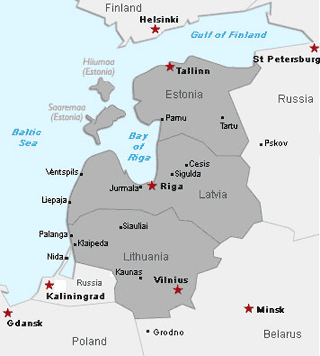 Are the chickens finally coming home to roost for European banks? As Latvia, Lithuania and Estonia bleed to death trying to maintain their currency pegs, Sweden’s finance minister has warned his country’s banks that they will face partial or complete nationalization if they turn to the government for help. Many fear that this is just the first sign of an impending disaster for European banks.
Are the chickens finally coming home to roost for European banks? As Latvia, Lithuania and Estonia bleed to death trying to maintain their currency pegs, Sweden’s finance minister has warned his country’s banks that they will face partial or complete nationalization if they turn to the government for help. Many fear that this is just the first sign of an impending disaster for European banks.
The proximate cause for the problem lies in the Batic countries. They have been attempting to maintain their currency pegs in accordance with Europe’s Exchange Mechanism but the end of that game is quite near.
From the Telegraph:
The dramatic situation in Latvia went from bad to worse on Thursday as overnight rates reached 140pc, a sign that the country’s currency peg in Europe’s Exchange Mechanism is close to snapping. Credit default swaps measuring risk on Latvian debt rocketed above 750 after Latvia’s treasury failed to sell a single note at a $100bn debt auction on Wednesday.
Latvian premier Valdis Dombrovskis said the country needs help “fast” from the European commission and International Monetary Fund, which has withheld the latest tranche of its €7.5bn (£6.6bn) bail-out because of the surging budget deficit. “Fears of a domino effect in the region are to a certain extent justified,” he said.
The Baltic trio are all defending currency pegs at overvalued rates in a region where every other country (except Finland) has devalued by a third or so. They are each caught in a trap after allowing mortgage lending in euros and Swiss francs to mushroom out of control. However, there are ways of dealing with this as Argentina proved by passing a law that switched all dollar mortgages into pesos in 2001 – entailing a 70pc “haircut” for foreign creditors.
It is understood that Latvia is quietly exploring options to shield its homeowners from the exchange risk. This risks a bitter clash with Brussels, which has been insisting on peg discipline for ideological reasons – against the advice of the IMF. But the current course amounts to a slow crucifixion of the Baltic economies. Latvia’s GDP is expected to contract by 18pc this year, and Lithuania’s by 15pc.
The key issue here is the amount of bank credit that has been extended to the former Communist bloc countries of Eastern Europe. Sweden’s exposure amounts to 22% of its GDP while Austria’s is a whopping 70% of GDP. No one expects that losses will be 100% so the potential effect is smaller than the total exposure but nevertheless it is significant. For example, in what’s termed an ugly scenario, Austrian banks might experience losses equal to 11% of GDP.
As we know from experience, banks don’t live in bubbles. They are interconnected so significant impairment of Swedish or Austrian banks would ripple through the European banking system and probably have some tangible effects on the U.S. system.
Once again, the sclerosis that’s endemic to Europe is on full display. The system simply isn’t set up to cope with crises of this scope and when push comes to shove each nation seems to revert to its national character rather than coming together as a union to solve the problem. Given Chancellor Merkel’s statements yesterday, I would venture to guess that the Baltics better beat a path to the IMF’s door as opposed to waiting for a hand up from the EU.
Disclaimer: This page contains affiliate links. If you choose to make a purchase after clicking a link, we may receive a commission at no additional cost to you. Thank you for your support!



Leave a Reply